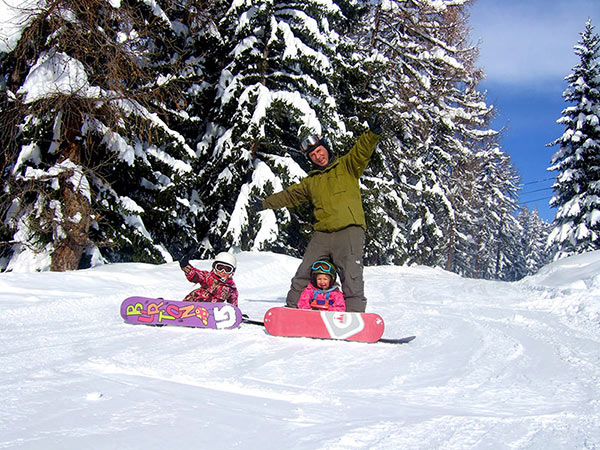Learning snowboarding at an older age is possible but may require more patience. It is important to understand that learning a new sport takes time and practice.
For many, snowboarding is a thrilling and exciting sport that offers a unique and challenging experience. But for those who didn’t grow up with the sport or haven’t had much experience on the slopes, the idea of learning to snowboard as an older adult can seem daunting. Some may even believe that they are “too old” to learn a new sport like snowboarding. While learning a new sport at an advanced age may take more patience and effort, it is still possible to become proficient in snowboarding. This article will explore the ways in which older adults can successfully learn to snowboard, including the importance of proper gear, finding a good instructor, and building up strength and endurance.

Credit: kidscanride.com
Benefits Of Snowboarding
There’s a common misconception in the snowboarding world that you need to start young to be able to learn and enjoy snowboarding. However, that’s not entirely true. You’re never too old to learn snowboarding, and there are many benefits that come with it, both physically and mentally.
In this blog post, we’ll explore the benefits of snowboarding and how it can positively impact your life.
Highlight On Physical And Mental Health Benefits Of Snowboarding
Snowboarding is an excellent way to improve your physical and mental health, no matter how old you are.
- improved cardiovascular health: snowboarding is a physically demanding sport that can get your heart pumping and improve your cardiovascular health.
- increased endurance and stamina: regular snowboarding can improve your endurance and stamina, allowing you to stay on the slopes for longer without feeling tired.
- full-body workout: snowboarding requires you to use your entire body, which results in a full-body workout. It’s a great way to build and tone your muscles, especially your legs, core, and back.
- stress relief: snowboarding forces you to focus on the present moment, which can help reduce stress and anxiety. After a day on the slopes, you’ll feel refreshed and energized.
- improved balance and coordination: snowboarding requires a lot of balance and coordination, which can help improve these skills over time.
Evidence-Backed Research Studies
Several studies have shown that snowboarding can have numerous physical and mental health benefits.
- A study published in the journal of sports medicine and physical fitness found that snowboarding can improve balance, flexibility, and endurance.
- Another study published in research quarterly for exercise and sport showed that snowboarding can improve core strength, leg power, and agility.
- Research conducted by the university of vermont found that snowboarding can improve mood and decrease stress levels.
How Snowboarding Can Change A Person’S Lifestyle
Snowboarding isn’t just a sport – it’s a lifestyle.
- connection with nature: snowboarding allows you to connect with nature and enjoy the beautiful mountains, fresh air, and sunshine.
- socialization: snowboarding is a popular sport, and the snowboarding community is welcoming and supportive. You can make new friends and bond with like-minded individuals.
- travel: snowboarding can take you to some of the most beautiful locations around the world. It’s a great way to explore new places and experience new cultures.
- increased confidence: snowboarding can be challenging, but once you master it, you’ll feel a sense of accomplishment and increased confidence.
Snowboarding is a fantastic sport that can benefit both your physical and mental health. It’s never too late to start, and the benefits are worth it. So what are you waiting for? Grab a board, hit the slopes, and enjoy all that snowboarding has to offer!
Age And Physical Limitations
Explain The Natural Physical Decline As We Age
As we age, our bodies undergo a natural physical decline, leading to decreased strength, flexibility, and balance. This can make activities like snowboarding more challenging for older individuals.
- Decreased muscle mass and bone density
- Reduced flexibility and range of motion
- Poorer balance and coordination
However, there are steps that individuals of any age can take to overcome these physical limitations and continue to enjoy snowboarding.
Limitations Of Snowboarding To People Above A Certain Age
While snowboarding can be enjoyed by people of all ages, there are some limitations for older individuals.
- Increased risk of injury due to decreased bone density and flexibility
- Greater difficulty in performing certain maneuvers, like jumps, due to reduced muscle mass and coordination
- Longer recovery time after falls or injuries
Despite these challenges, many older individuals continue to snowboard and enjoy the thrill of the sport.
How To Overcome Age-Related Physical Limitations While Snowboarding
While age-related physical limitations can make snowboarding more challenging, there are ways to overcome them:
- Stay physically active outside of snowboarding to maintain strength, flexibility, and coordination. This can include activities like yoga, weightlifting, or cardio workouts.
- Work with a professional instructor to develop proper technique and avoid injury.
- Invest in protective gear like a helmet and wrist guards to reduce the risk of injury.
- Take breaks and rest when needed to prevent fatigue and reduce the risk of falls.
By taking these steps, older individuals can continue to enjoy snowboarding while minimizing the risk of injury and maximizing their enjoyment of the sport. Remember, it’s never too late to try something new and push yourself to new heights.
Six-year-old girl is a skateboarding prodigy
Age Vs Experience
Snowboarding is an exciting sport that offers thrills and excitement to people of all ages. However, the question of age and snowboarding arises quite often. People often wonder whether they are too old to learn snowboarding or if it is better to start at a young age.
In this blog post, we will discuss the relationship between age and snowboarding experience.
The Advantage Of Learning Snowboarding At A Young Age
Starting snowboarding at a young age can have significant benefits.
- Young children tend to be more fearless and less inhibited in trying new things. This can be an advantage when learning snowboarding, a sport that requires a lot of courage and determination.
- Children’s bodies are incredibly flexible and can adapt more quickly to the movements required for snowboarding.
- Learning snowboarding at a young age ensures that the individual has more time to become proficient in the sport and can enjoy it for a more extended period.
The Benefits Of Life Experience In Snowboarding
Age is just a number, and people can learn snowboarding at any age. In fact, life experience can have several benefits for people learning snowboarding.
- Adults tend to be more patient and disciplined, which can be an advantage when learning snowboarding, a sport that requires a lot of practice and perseverance.
- Adults often have more finances, which enables them to take snowboarding lessons and invest in better gear, both of which can be advantageous in learning the sport.
- Adults tend to have better spatial and body awareness, which can be beneficial when learning snowboarding.
Argument For Age And Experience Complementing Each Other In Snowboarding
While learning snowboarding at a young age or as an adult both have advantages, there is an argument to be made for the combination of age and experience in snowboarding.
- The combination of a young mind and an experienced body can be a powerful asset in learning snowboarding.
- People who’ve been snowboarding for an extended period have a better understanding of their body and how it moves, making them better equipped to learn new tricks and maneuvers.
- Adults learning snowboarding can learn faster by taking the guidance of experienced coaches who can identify weaknesses and help overcome them.
Whether you start learning snowboarding at a young age or as an adult, age and experience complement each other, and both offer valuable advantages in snowboarding. With patience, practice, and determination, anyone can learn this exhilarating sport regardless of age.
Overcoming Fear Of Injury
Snowboarding is a fun and exciting sport that attracts people of all ages. However, some people assume that they are too old to learn snowboarding, thinking that the sport is only for the young and risk-takers. One of the most common anxieties among new snowboarders is the fear of injury.
But it’s important to note that with the right techniques and mindset, you can minimize the risk of getting injured while snowboarding. In this blog post, we will discuss how to overcome your fear of injury while snowboarding.
Address Common Anxieties And Fears Associated With Snowboarding
Snowboarding involves physical exertion as well as the potential for accidents and injuries. Therefore, it’s natural to feel a bit anxious or fearful when attempting the sport, especially if you’re new to it.
- Fear of falling and getting injured
- Fear of not being able to control the board
- Fear of looking silly or embarrassing yourself
However, it’s crucial to recognize that these anxieties are normal and can be overcome with the right approach and mindset.
- Take lessons from a qualified instructor
- Start on gentle slopes and progress gradually
- Wear the proper safety gear, including a helmet and wrist guards
- Practice control techniques, such as carving and stopping
Ways To Minimize Injury Risks While Snowboarding
Although snowboarding carries the risk of injuries, there are ways to reduce the likelihood of getting hurt.
- Warm up before hitting the slopes
- Wear proper-fitting boots and bindings
- Stay within your skill level and avoid attempting slopes that are beyond your ability
- Be aware of your surroundings and other snowboarders
- Avoid fatigue by taking frequent breaks
Importance Of Taking Safety Measures Seriously
To fully enjoy the experience of snowboarding, it’s crucial to take safety measures seriously. Snowboarding is a sport that requires physical exertion, and with that comes risk. By taking safety measures seriously, you reduce the likelihood of getting hurt and can enjoy the sport to the fullest.
- Wearing a helmet and other protective gear
- Checking your equipment regularly
- Staying aware of your surroundings
- Knowing and sticking to the rules and guidelines of the resort
- Taking lessons from a qualified instructor
Snowboarding is a sport that can be enjoyed by all ages, and fear of injury should not prevent anyone from participating. By following these techniques and taking safety measures seriously, you can overcome your anxieties and minimize the risk of getting hurt.
With patience, practice, and proper technique, you can enjoy the thrill and fun of snowboarding.
Training And Preparation
Snowboarding is a winter sport that has been gaining immense popularity in recent years. However, some people might feel hesitant to try it out, thinking that they’re too old to pick up a new sport. The truth is, it’s never too late to learn snowboarding if you’re well-prepared and trained.
In this article, we will be discussing the key aspects of snowboarding training and preparation to help you feel more confident about hitting the slopes.
Tips For Training And Preparing For Snowboarding
Preparing for snowboarding is not just about getting the correct gear and heading out to the slopes. It’s essential to train and prepare your body to avoid any injuries or falls.
- Start with strength training exercises to build your core, legs, and arms’ muscles.
- Try balance and coordination drills to help you remain stable while snowboarding.
- Cardiovascular training like cycling, jogging or swimming is also crucial to increase your stamina.
- Practicing yoga or stretching exercises can help you improve your flexibility, balance, and range of motion.
Key Aspects Of A Successful Snowboarding Training Program
A successful snowboarding training program takes some time and effort, but it can make a world of difference in your performance.
- Start training well in advance before the snowboarding season starts.
- Identify your strengths and weaknesses and tailor your training program accordingly.
- Begin with basic snowboarding skills like standing, turning, and stopping before moving onto complex techniques.
- Take lessons from a professional snowboarding instructor who can guide you and correct any mistakes you may make.
Importance Of A Healthy Diet And Exercise For Snowboarding
Snowboarding is a physically demanding sport, and it’s crucial to fuel your body with nutritious food to maintain your energy levels. A healthy diet and regular exercise routine can help you improve your overall fitness levels and endurance, making you less prone to injuries while snowboarding.
- Include whole grains, lean protein, fruits, and vegetables to your diet.
- Avoid processed and high-sugar foods that can leave you feeling sluggish.
- Drink plenty of water to stay hydrated.
- Incorporate strength and cardio exercises to increase your strength, agility, and endurance.
It’s never too late to learn how to snowboard if you’re well-trained and prepared. Following a well-rounded training program that includes strength training, balance and coordination exercises, and cardiovascular training can help you improve your snowboarding skills and reduce the risk of injuries.
A healthy diet and regular exercise routine can also help you maintain your overall fitness levels and endurance. Get ready to shred the slopes with confidence and enthusiasm!
Conclusion
Age is just a number, and you are never too old to learn snowboarding. While it may be harder for older individuals to learn as compared to younger folks, taking lessons from a trained instructor and practicing regularly can make it possible.
Besides staying fit and agile, snowboarding can also be an excellent stress-reliever and a way of connecting with nature. So, if you have been wondering whether it’s time to give snowboarding a try, we would say go for it! With patience, determination and an open mind, anyone can learn this exhilarating sport.
It’s never too late to try something new and exciting, and you may be surprised at how much you enjoy it. Embrace the challenges and enjoy the ride- that’s the true essence of snowboarding!



